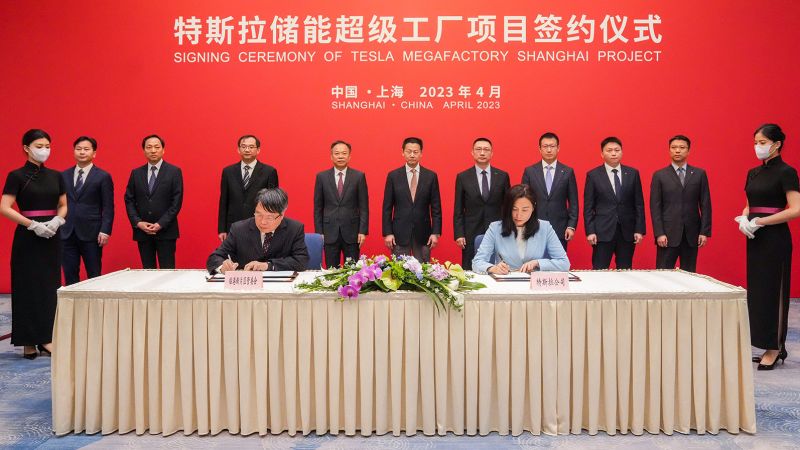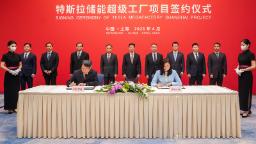

New York/Hong Kong
CNN
—
Tesla will open a Megapack battery factory in Shanghai, it said on Sunday, as it doubles down on its investment in China even as political tension rises between Beijing and Washington.
The news was announced just days after Airbus unveiled plans for a second final-assembly line in the country’s north, with officials publicly rolling out the welcome wagon for foreign investors.
The Tesla factory will be able to produce 10,000 Megapacks, which are very large batteries used to store huge amounts of electricity, the company said in
a tweet. It announced the new factory with a picture of a signing ceremony in China.
“Tesla opening Megapack factory in Shanghai to supplement output of Megapack factory in California,” Elon Musk said on Twitter.
Megapacks are meant to be used as massive batteries to help stabilize energy grids. Each unit can store enough energy to power an average of 3,600 homes for one hour, the company says. They are designed for utilities and large-scale commercial projects, not vehicles.
Chinese state media outlet Xinhua was the first to report the news, saying the electric automaker will break ground in this year’s third quarter and begin production in the second quarter of 2024.
The Shanghai facility would have the same level of production capacity as Tesla’s Megafactory in Lathrop, California — equivalent to 40 gigawatt-hours of energy storage.
“We believe this announcement is a potential game changer for Tesla on the battery front,” said Daniel Ives, an analyst at Wedbush Securities. “In this EV [electric vehicle] arms race Tesla is further building its lead in battery technology with the new Megapack factory in China another flex the muscle moment for Musk.”
Last month, Apple
(AAPL)’s Tim Cook visited Beijing in show of support for the country as a market and manufacturing base amid escalating political rhetoric between the United States and China.
The Megafactory will be located in Lingang, an enormous free trade zone on the outskirts of Shanghai, where Tesla’s electric-vehicle Gigafactory broke ground in 2019.
That facility was built within 10 months, at 65% of the cost of the Model 3 production plant in the United States. Within a few years, it became the biggest EV production plant on the planet. The Shanghai facility is Tesla’s main export hub, supplying vehicles to most markets outside of North America.
Tesla is also making inroads among Chinese drivers. Last week, the China Passenger Car Association (CPCA) said the company sold 88,869 units of Shanghai-made EVs in March. According to Reuters, that figure was 35% higher than a year ago.
Tesla is the second largest EV maker in the country behind market leader BYD
(BYDDF), which sold 206,089 units last month.
In January, Tesla slashed prices in China for the second time in less than three months, in an effort to boost sales as amid slowing demand in the world’s largest car market.
The cuts came days after Beijing ended a 13-year-long subsidy for electric vehicle purchases, a move that is expected to put further pressure on car demand.
The Chinese government had planned to phase out its costly EV subsidy program by the end of 2020, but extended it during the pandemic to avert a sharp economic slowdown.
For 2023, the CPCA estimates sales of “new energy cars,” which are mostly EVs, to reach 8.5 million units, which will account for 36% of total car sales, according to the official China Securities Journal.
Total passenger cars sales in China hit 20.5 million units in 2022, up just 1.9% from the year before, the association was quoted as saying, as the country dealt with the impact of strict Zero-covid controls that were relaxed only late in the year.
— Chris Isidore and Laura He contributed to this article.
